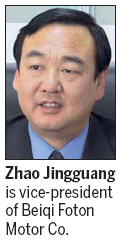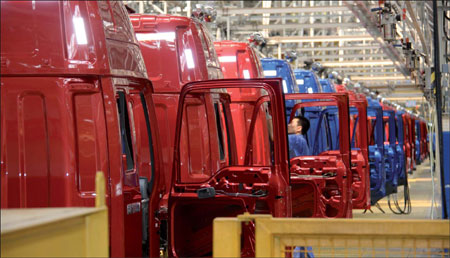In search of greener pastures
Updated: 2012-10-19 10:40
By Wang Chao (China Daily)
|
|||||||||||
|
A Beiqi Foton Motor Co factory in Beijing. The largest commercial vehicle maker in China is expanding to overseas markets to drive future growth. Provided to China Daily |
Truck makers in congested Chinese market set horizons overseas
Twenty years ago, foreign companies swarmed to China to make fortunes, but today the gold rush has been reversed, with Chinese companies prospecting overseas.
A leading Chinese truck maker is one with eyes on the international markets, especially emerging economies, at a time when domestic economic growth is slowing down.
 |
Established in Beijing in 1996, Beiqi Foton Motor Co has grown from a small agricultural machinery company to China's leading commercial vehicle manufacturer in terms of sales volume over the past decade. Its annual report shows that it earned 52 billion yuan (6.4 billion euros; $8.3 billion) in 2011 exporting 36,367 vehicles.
Foton have already made an impact on the world truck market this year. In March, it established a company in Kenya, another major investment in Africa after it opened a KD factory in east Africa last year. It also secured a site in India, where a factory will be built by the end of 2013.
"Foton will not be the high-end brand in the global market, but a medium-level one," says Zhao Jingguang, vice-president of Foton. "That means there is no luxury configuration, but the products will meet emission and safety standards."
In 2010, the company formed an overseas expansion strategy called "5+3+1". This means by 2020, it will build factories in five overseas markets (India, Russia, Brazil, Mexico and Indonesia), each with a production capacity of 100,000 units; make breakthroughs in three mature markets (North America, Europe, and South Korea-Japan); and build one R&D center in Beijing for new-energy vehicles.
Another truck manufacturer, China National Heavy Duty Truck Group Corp, also has ambitious plans to drive deep into the overseas market. Company president, Ma Chunji, says it aims to conquer six major markets including Southeast Asia, the Middle East and Russia.
Though these overseas adventures seem glorious and daring, they are also expensive and risky. The flux of companies moving outward in the past two years signals that the domestic market is no longer an easy one for Chinese companies.
Auto industry analysts say that the over-capacity of Chinese truck companies has forced them to think beyond China's borders.
At the end of 2011, there were more than 10 truck makers in the country, taking up 97 percent of the market. The saturated market is already slimming the company's profit margin, and is exacerbated by the economic downturn.
Shi Jianhua, deputy secretary-general of China Association of Automobile Manufacturers, says the commercial vehicle market is greatly affected by the macro-economy.
"The market may not be as bullish as in 2008 and 2009, and with the economy cooling down, the truck market is returning to mild growth," Shi says.
According to Xu Changming, director of the State Information Center's information resource unit, all sectors of the Chinese truck industry, including heavy-duty, medium and light trucks, suffered from the downturn. The heavy-duty truck sector was worst affected, shrinking by 30 percent in terms of sales volume.
Meanwhile, export figures from major truck companies have increased by more than 10 percent over the past nine months.
"So companies have to improve their product quality and think beyond the domestic market," Shi says. "Or many will find it hard to survive."
As the Chinese government determined to transform the economic growth pattern from investment-driven to consumption-driven, the truck industry, which is closely related to the construction sector, is finding it hard to regain the growth rate it enjoyed three years ago.
Wu Yuejun, president of Beijing Foton Daimler Automotive Co, believes the market will not grow significantly for a long time, and the industry faces consolidation.
"Currently, there are more than a dozen truck companies in China, but in 10 years, the number may shrink to three or four," he says.
Zhao, Foton's vice-president, says they "have to go abroad to expand our market", adding that India, Russia, Brazil, Mexico and Indonesia are still fast-growing markets.
"Starting from the ground up is not easy, so we select the best international resources, and partner with them," he says. A joint venture with Cummins Inc, a US-based engine manufacturer, formed in 2008, recovered investment last year and began to make a profit, he adds.
As the biggest engine manufacturer in the world, Cummins has been keeping in line with European emission standards.
"As Foton is designed for the global market, a greener engine will help us enter a mature market with stringent emission standards," Zhao says.
Daimler is another partner that helps accelerate Foton's international progress. In February, the two companies formed a joint venture aiming to produce medium-sized trucks fitted with a Mercedes engine.
The partner not only brought reputation and technologies to Foton, but also global networks. "In the future when the joint-venture products are exported, Daimler can provide established distribution networks around the world," Zhao says.
But Foton will be very careful in terms of overseas expansion, says Zhao. "The cost to build a factory overseas is very high, so we have to wait until the market reaches a certain volume, or else, the after-sales service will not catch up."
With emerging markets such as Brazil and Russia attracting investment from many Chinese companies , Zhao says they should avoid another round of price competition at home.
"We have to differentiate the Foton brand from other brands which are generally labeled as made in China," Zhao says.
The five overseas markets listed in the 5+3+1 strategy will not be developed at the same time, he adds, but will be explored one by one.
"Once the market is mature, it will be handed over to the management team recruited locally, as they know the market better," he says.
wangchao@chinadaily.com.cn
(China Daily 10/19/2012 page15)
Today's Top News
Rescuers race against time for quake victims
Telecom workers restore links
Coal mine blast kills 18 in Jilin
Intl scholarship puts China on the map
More bird flu patients discharged
Gold loses sheen, but still a safe bet
US 'turns blind eye to human rights'
Telecom workers restore links
Hot Topics
Lunar probe , China growth forecasts, Emission rules get tougher, China seen through 'colored lens', International board,
Editor's Picks

|

|

|

|

|

|






